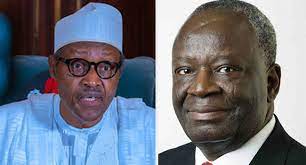NEWS
Buhari will Leave Nigeria Better than he met it, says Gambari

The Chief of Staff to the President, Prof. Ibrahim Gambari has extolled President Muhammadu Buhari’s style of leadership, saying the president will be remembered for leaving a legacy of leadership by example and excellence.
Gambari stated this when he inaugurated the 54-seater State House Multi-Purpose Training Centre, fitted with state-of-the-art multimedia equipment, and renovated ward and three new ambulances at the State House Clinic, on Thursday in Abuja.
The New Ward is housing the Medical Out-Patient Department (MOPD), Dialysis unit, HIV/AIDS unit, among others, at the State House Clinic.
According to the Chief of Staff, President Buhari is determined to leave Nigeria better than he met it.
He, therefore, urged public office holders to emulate the president on the provision of infrastructure and enhancing the capacity of the civil service on service delivery.
”If everybody does their best to improve on what they find, by the time President Buhari leaves office at the end of his administration, he will leave facilities much better than he found it,”
While commending the significant improvements at the Clinic, Gambari noted that the renovated ward would improve the quality of service to staff members and other beneficiaries of the medical centre.
He also applauded President Buhari for enhancing the capacity of State House staff and all Agencies of government to deliver to the best of their abilities.
At the Multi-Purpose Training Centre, Gambari affirmed that the Buhari administration was committed to promoting excellence in public service, driven by ICT development.
He added that directors in the Federal civil service aspiring for the position of Permanent Secretary must pass ICT proficiency test.
”You cannot become a Permanent Secretary in the Federal Civil Service of the Federal Republic of Nigeria anymore, unless you have a solid ICT background.
”The State House is supposed to be an epitome of excellence and that’s why whether it’s the Press Centre, or the ongoing Presidential VIP Wing of State House Clinic, this new Centre is an addition to the standard of excellence expected at the Villa,” he said.
Earlier in his remarks, the Permanent Secretary, State House, Tijjani Umar, said the training centre would enhance the ability and capacity of staff as well as other users, in the public sector, in service delivery.
He recalled that the State House ICT Training Centre was commissioned last year, noting that the management recognises that ICT is the driver of development and a positive workforce.
Umar announced that Galaxy Backbone in collaboration with State House has concluded arrangements for a training session on ICT with all Federal Permanent Secretaries at the newly inaugurated 54-seater auditorium.
At the Clinic, the Permanent Secretary told the Chief of Staff that the medical centre has some of the ”best hands in their various fields” in Abuja and around the country.
According to him, some of the medical staff can compete with their peers globally.
While commending the medical staff for their dedication and cooperation, Umar said the management would soon upgrade an ICT-driven system for the supply of drugs, consumables and everything needed to run the Clinic more effectively. (NAN) (www.nannews.ng)
SYC/SH
NEWS
Enhancing Agricultural Productivity Through Research

By Abachi Ungbo
Agriculture is an important economic activity that is providing employment to a huge segment of the Nigeria population and also contributing to the nation’s Gross Domestic Product (GDP).It is dominated by small holders on whose thin shoulders the needs of the entire population rest upon.
The productivity of their farmlands is small and their income hardly commensurate with the huge effort they apply. They are overwhelmed by not a few challenges which have continued to haunt the nation in general.No doubt, Nigeria agriculture is struggling to unleash its full capacity despite many efforts. It is worrying that the overall productivity of the sector hasn’t dramatically improved in the face of growing population, nutritional deficiency, effect of climate change, volatile food prices and pervasive poverty.Agricultural production continues to be hobbled by familiar challenges associated with low crop yield, incidence of pest and diseases, post- harvesting losses, plummeting soil fertility etcThe poor state of agriculture underscores the necessity for extraordinary approaches and strategies in circumventing the host of challenges to unlock the boundless capacity of agriculture to ensure it serve its purposes.In 2013 in Maputo, the African Union (AU) under the Comprehensive Africa Agriculture Development Program (CAADP) laid out an elaborate plan for the development of Africa’s agriculture with an agreement by member states for the allocation of 10% of public expenditure to agriculture and an 6% annual growth of the sector. In 2014, under the Malabo declaration, member states reaffirmed their commitment to the vision.Interestingly, meeting the goal as enshrined in the CAADP remains a tall order! A case in point is the 2025 national budget. Agriculture was allotted 826.5 billion naira which constituted about 1.73% of the total budget of 47.97 trillion naira – a far cry from the agreement. In the budget, 40 research institutes were allocated 126.03 billion naira while federal universities of agriculture got 54.38 billion.The allocation to the institutions is paltry judging from the huge financial requirement inherent in undertaking any meaningful research activity and in running the institutions. The Pillar IV of the CAADP placed emphasis on agricultural Research and Development (R&D).A vibrant research- led approach stands as a conspicuous missing link in the chain of agricultural production. We are witnesses to the infinite human ingenuity which has always been brought to bear in making agriculture responsive to emerging challenges leading to massive revolution in the sector through a multidisciplinary approach.Research has always provided answers to challenging questions that have changed the trajectory of agriculture. Agricultural research ensures that new technologies, techniques and practices are developed to improve productivity.Instructively, improving agricultural productivity is a foolproof strategy for promoting inclusive economic development and reducing poverty. Through the strategy, the income of farm households is ramped up and food cost curtailed which serves as a cushion to non-farm households who are known to expend a massive amount of their income on food.Agricultural research has a long history in Nigeria leading to the establishment of many research institutes and universities of agriculture. As well as a body known as Agricultural Research Council of Nigeria saddled with the responsibility of supervising and coordinating agricultural research and extension activities.In effect, the country has one the most elaborate National Agricultural Research Systems (NARSs) in Africa.Through public funding the institutions have recorded massive achievement. However, they are currently a shadow of their former selves. Their current state tells a sad story of neglect and underfunding. The entire institutions have a similitude of challenges which has continued to limit the actualization of their mandate.The institution needs to be well funded to promote productivity, sustainable growth and general transformation of the sector. It is against this background, that the recent National Agricultural Development Fund (NADF) report on the baseline survey and need assessment carried out on 16 agricultural institutions and 17 colleges of agriculture requires massive attention in order to place the research institutions on the path of glory.Research and Development can never be successful without sufficient funding. The effectiveness and efficiency of the research can be narrowed to the generous monetary allocation that will cover the operating costs of the institutions, salaries, training and capacity building, investment in modern laboratories, equipment, relevant research facilities and data management system.The entire approach to research needs to be attractive enough to draw and retain talents. The place of accountability and transparency cannot easily be discounted in the entire management system of the research institutions. Also, is the need for strengthening the extension system. Access to new technology and practices by the end users through the agency of a vibrant extension system is imperative and must have its wheels adequately oiled.In the final analysis, productivity will further be enhanced through the synthesis of improved agricultural research funding and the continuation of policy reforms.Abachi Ungbo, abachi007@yahoo.comNEWS
Gov Adeleke Deploys 1,750 Imole Teachers Corps to Osun Schools

From Ayinde Akintade, Osogbo
As financial constraints delay planned mass teachers’ recruitment, Governor Ademola Adeleke has deployed a total of One Thousand, Seven Hundred and Fifty Imole Youth Corps teachers to primary and secondary schools across Osun state.The Governor is also seeking more deployment of members of the National Youth Service Corps to Osun state for posting to schools in the state.
These measures are stop gap actions to address personnel shortage in some schools and to prepare ground for the expansion of teaching personnel in critical subject areas. The Imole Youth Corps members posted to the schools hold Nigeria Certificate of Education and University degree qualifications and are already functioning in various schools in the state.The breakdown of the posting are as follows: Ayedaade – 65; Atakumosa East 35; Atakumosa west 43; Ayedire 47; Boluwaduro 44; Boripe 33; Ede North 74; Ede South 66; Egbedore 56; Ejigbo 87; Ife central 61; Ife East 28; Ife North 39; Ife South 50.Others are Ifedayo- 58; Ifelodun -58; Ila Orangun- 83; Ilesa East -61; Ilesa West- 68; Irepodun -43; Irewole- 74; Isokan -19; Iwo -87; Obokun- 50; Odo Otin -77; Ola Oluwa -43; Olorunda- 44; Oriade -106; Orolu -41; Osogbo -80; and Modakeke Area Office -33.Governor Adeleke in his response to the development reaffirmed the determination of the government to strengthen the school system through multiple innovations to further improve Osun attainment in national and local examinations.According to the Governor, Osun ranking in national examination will soon hit between number 1 to 3 from the present 7th position, promising that teachers recruitment will be achieved before the next elections.“We will recruit more teachers once the financial climate improves. We are however committed to ensuring a narrowing of the personnel gap in our schools. That is why we innovated on the Imole Teachers Corps.“We will train and retrain those presently in service. I commend the principals and great members of the Nigerian Union of Teachers. We appreciate the Parents-Teachers Association. “We will Continue to improve the learning environment for our pupils and students. To this end, we commend the private school operators. They are a critical sector in the positive development of education in our dear state”, the Governor was quoted as saying.NEWS
NAICOM Issues Guidelines for Insurtech Operations in Nigeria

By Tony Obiechina, Abuja
The National Insurance Commission (NAICOM) has officially issued operational guidelines for Insurtech businesses in Nigeria, following extensive stakeholder consultation and engagement.The guidelines, effective from August 1, are designed to provide a clear and unified regulatory framework for the licensing, operations and supervision of Insurtech firms in Nigeria.
The guidelines aim to foster innovation that can lead to the development of new and innovative insurance products and services; ensure consumer protection and improve consumer experience, prioritizing consumer interests and providing better services and provide clarity on regulatory requirements, reducing uncertainty and ambiguity. Others were, help build trust and confidence in the Insurtech sector, driving growth and adoption; and advance digital transformation within the Nigerian insurance sector.Key Objectives of the Guidelines include, promoting the growth and development of Insurtech in Nigeria; establishing regulatory standards for Insurtech setup and operations and encouraging responsible innovation while safeguarding consumer interests.Others are, defining general product features specific to Insurtech; providing a licensing structure for both Partnering and Standalone Insurtech firms and facilitating the transition of eligible operators into fully licensed standalone Insurtech entities, as well as supporting Nigeria’s broader digital economy and fintech ecosystem.The Application are categorised into partnering Insurtech permitted to transact specific classes of insurance in collaboration with licensed insurers; Standalone Insurtech: permitted to transact the categories of insurance as may be specified in its license, excluding special risk products such as Oil and Gas Insurance, Marine and Aviation Insurance, Retirement Life Annuity and insurances of government assets and liabilities for Ministries, Departments and Agencies.Prospective operators must submit applications in accordance with the procedures outlined in Schedule I of the Guidelines. NAICOM reserves the right to grant licenses with conditions deemed necessary under existing laws and this new regulatory framework.Insurtech firms must comply with provisions related to risk management, investment practices, actuarial standards, outsourcing, and other key operational parameters as detailed in the Commission’s Prudential Guidelines.Disputes between Insurtechs and partner insurers must first follow arbitration protocols outlined in their agreements before approaching NAICOM. Consumers may refer unresolved issues from insurance transactions directly to the Commission for review and resolution.Deadline for all existing insurance institutions and Insurtech firms operating under any arrangement classified as Insurtech must fully comply with these Guidelines within 30 days of the effective date.



















